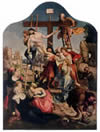Module 2: Section A
At Last to Rome
Emerson on Art
Ralph Waldo Emerson was a great transcendentalist poet and thinker dedicated to the ideas of self-reliance and transcendence. Listen as Emerson speaks about what he learned from the great art of Europe.

"I remember, when in my younger days I had heard of the wonders of Italian painting, I fancied the great pictures would be great strangers; some surprising combination of color and form; a foreign wonder, barbaric pearl and gold, like the spontoons and standards of the militia, which play such pranks in the eyes and imaginations of school-boys. I was to see and acquire I knew not what. When I came at last to Rome, and saw with eyes the pictures, I found that genius left to novices the gay and fantastic and ostentatious, and itself pierced directly to the simple and true; that it was familiar and sincere; that it was the old, eternal fact I had met already in so many forms, — unto which I lived; that it was the plain you and me I knew so well, — had left at home in so many conversations."
(Ralph Waldo Emerson on art)
The main idea is stated in the last sentence. The great painters from long ago and far away made me realize that there's no place like home.
First person. The author is telling about himself and his experiences.
This is up to you, but some possibilities are: foreign wonder; barbaric pearl and gold; genius left to novices the gay and fantastic and ostentatious; and itself pierced directly to the simple and true.
The Writer is most important. He is telling about his memories and expresses who he is through the lessons he learns.
To express the self. The passage is meant to express who Emerson is and what is important to him.
The Expressive Purpose in rhetoric can be identified by the following characteristics:
- Point of view: first person
- Focus on the writer
- Personal thoughts, feelings, and experiences expressed
- The learns something about the writer
Click on the examples below to see types of rhetoric that EXPRESS.
| Examples from the story | Types of rhetoric that EXPRESS |
| "barbaric pearl" | |
| "that it was the plain _you and me_ I knew so well" | |
| "I found that genius left to novices" |

